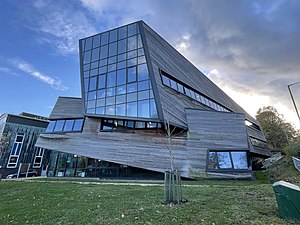This article has multiple issues. Please help improve it or discuss these issues on the talk page. (Learn how and when to remove these messages)
|
 | |
| Established | November 2002 |
|---|---|
| Purpose | Cosmology |
| Coordinates | 54°46′01″N 1°34′30″W / 54.76694311327431°N 1.5749791848612393°W |
Director | Shaun Cole |
Parent organization | Durham University |
| Website | icc |
The Institute for Computational Cosmology (ICC) is a research institute[1] at Durham University, England. It was founded in November 2002 as part of the Ogden Centre for Fundamental Physics, which also includes the Institute for Particle Physics Phenomenology (IPPP). The ICC's primary mission is to advance fundamental knowledge in cosmology. Topics of active research include: the nature of dark matter and dark energy, the evolution of cosmic structure, the formation of galaxies, and the determination of fundamental parameters.
The current director of the ICC is Shaun Cole.[2] ICC researchers have played a central role[3][4][5] in the development of the standard model of cosmology, Lambda-CDM model (ΛCDM). Because of the vast scale of questions in cosmology, advances often require supercomputer simulations in which a virtual Universe is allowed to evolve for 13.8 billion years from the Big Bang to the present day. The simulation is rerun with different ingredients or different physics, until it matches the observed Universe. This approach has required one of the most powerful supercomputers for academic research in the world, the “Cosmology Machine (COSMA)” as part of the DiRAC supercomputing consortium.[6]
- ^ "Durham University Research Institutes". Archived from the original on 16 December 2013. Retrieved 6 September 2013.
- ^ "Institute for Computational Cosmology - Durham University". www.dur.ac.uk. Retrieved 20 November 2020.
- ^ Davis, M.; Efstathiou, G.; Frenk, C. S.; White, S. D. M. (1985). "The evolution of large-scale structure in a universe dominated by cold dark matter". Astrophysical Journal. 292: 371. Bibcode:1985ApJ...292..371D. doi:10.1086/163168.
- ^ Cole, Shaun; Lacey, Cedric G.; Baugh, Carlton M.; Frenk, Carlos S. (2000). "Hierarchical galaxy formation". Monthly Notices of the Royal Astronomical Society. 319 (1): 168–204. arXiv:astro-ph/0007281. Bibcode:2000MNRAS.319..168C. doi:10.1046/j.1365-8711.2000.03879.x. S2CID 17395956.
- ^ Dodelson, Scott (2003), Review of astro-ph topcites, retrieved 6 September 2013
- ^ Listed as 12th overall in the UK, 134th in the world by "Top 500 supercomputer sites". June 2012. Archived from the original on 2 November 2013. Retrieved 6 September 2013.